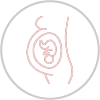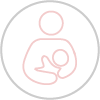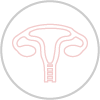You may notice this separation towards the latter stages of your pregnancy and following childbirth.
It is commonly identified by a ‘doming’ effect when you use your tummy muscles to move, or as a persistent bulge through the abdominal wall when coughing/laughing, lifting or sitting forwards.
This separation indicates that the deeper abdominal muscles have become over stretched and weakened. As your baby grows and increases in size during your pregnancy, the abdominal muscles are put under huge strain. The Linea Alba, which is toughened connective tissue running down the centre of your abdominal muscles, is put under immense strain as it’s often the point of maximal stretch. Along with the effects of the Relaxin hormone, it is left vulnerable to over-stretch. The two Rectus Abdominis muscles subsequently separate when they can’t stretch outwards any further. It is a very common problem, but one that is important to address.
The deep muscles of your tummy act like a corset around you, supporting and protecting your back and your pelvic organs. Your abdominal muscles give your pelvis and spine a huge amount of stability. If they are weak, which they will be following pregnancy and C-section (let alone weakened further with a diastasis), you are at greater risk of developing back pain, pelvic pain, poor posture, pelvic floor muscle weakness and/or prolapse. With a large and persistent diastasis, you are also at risk of abdominal hernias.
Suffering with a Recti Diastasis can make simple activities in life difficult, time-consuming and painful….especially when there’s a baby to be caring for as well!
Physiotherapy for Recti Diastasis:
- Assessment of the size of muscle separation
- Assessment of abdominal muscle activation, tone, strength and control
- Assessment of pelvis, spine and joints for movement, stability and control
- Advice for back care in every day activities
- Postural exercises
- Teaching of abdominal exercises to prevent ‘doming’ and exacerbation of your symptoms
- Teaching of pilates based core stability exercises
- Guidance on gradual return to exercise and increased level of activity as symptoms allow



